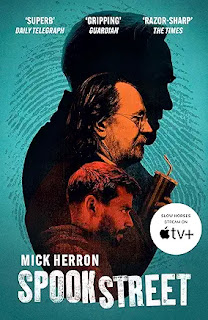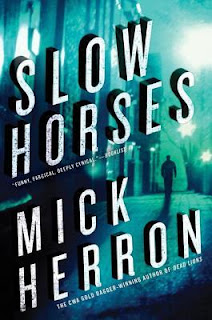Anthony McIntyre 🔖 The title is a giveaway.
Slow Horses are by no means safe horses. The Spook Street course is a fence-strewn one where there are fallers, characters permanently removed, leaving the empathetic reader to mourn their departure. That is what the world of the novel does. The reader can in real life find the type portrayed as anathema, but fiction offers an escape route from the rigours of life actually lived. In the Herron novel British spooks find themselves transformed from obnoxious villains to likeable rogues. The revolutionary purist might raise the alarm at that, insisting that novels are ideological constructs and should be avoided in favour of The German Ideology so that the reader might better understand their true self and the real relationship between that self and the world. Our illusions will be stripped away, and the truth revealed. Praise Lenin. It only takes one good book, even if handed to you by a feckless and fickle functionary already recruited by the spooks, to achieve that. As good a reason as any for not wanting to sit beside either a ban-again revolutionary or a born-again Christian on a train. Amen Jesus. Pass it onto the next unsuspecting victim. I am vouched for, bought and sold by the novel and its offer to the mind of unlimited space.
Slow Horses novels are deliciously irreverent, a tried and tested mockery method that brings a quiver to the famed British stiff upper lip while causing a ripple of indignation to weave its way across the old boy network. While the characters in Fuck Up Central can be likeable, move outside the dank confines of Slough House towards the Park and it is painfully clear that the creatures inhabiting Park life show no sign of those endearing features that caress even the jaundiced reader into letting go of their hostility for the duration of the book.
Bad Sam Chapman, one time head dog . . . what was all that about?
Mick Herron, 2017, Spook Street. Baskerville ASIN: B01KXPVEJW.
It is either about spirits or spies, entities that in unsolicited fashion haunt or hunt others, often without reciprocation. Add the name Mick Herron and instantly the reader familiar with Slough House knows this book belongs to the espionage genre.
Slow Horses are by no means safe horses. The Spook Street course is a fence-strewn one where there are fallers, characters permanently removed, leaving the empathetic reader to mourn their departure. That is what the world of the novel does. The reader can in real life find the type portrayed as anathema, but fiction offers an escape route from the rigours of life actually lived. In the Herron novel British spooks find themselves transformed from obnoxious villains to likeable rogues. The revolutionary purist might raise the alarm at that, insisting that novels are ideological constructs and should be avoided in favour of The German Ideology so that the reader might better understand their true self and the real relationship between that self and the world. Our illusions will be stripped away, and the truth revealed. Praise Lenin. It only takes one good book, even if handed to you by a feckless and fickle functionary already recruited by the spooks, to achieve that. As good a reason as any for not wanting to sit beside either a ban-again revolutionary or a born-again Christian on a train. Amen Jesus. Pass it onto the next unsuspecting victim. I am vouched for, bought and sold by the novel and its offer to the mind of unlimited space.
Slow Horses novels are deliciously irreverent, a tried and tested mockery method that brings a quiver to the famed British stiff upper lip while causing a ripple of indignation to weave its way across the old boy network. While the characters in Fuck Up Central can be likeable, move outside the dank confines of Slough House towards the Park and it is painfully clear that the creatures inhabiting Park life show no sign of those endearing features that caress even the jaundiced reader into letting go of their hostility for the duration of the book.
The fifth in the series, if one novella is counted, Spook Street opens with a bang, a very loud one. A bomber self explodes in a shopping centre where a large group of young people have converged to perform a flash dance. Easy enough to imagine against a background of attacks on musical festivals whether at Bataclan or Manchester Arena. The potential for multiple targets offering lots of blood from those sacrificed is the draw. The person administering the bomb-sting invariably poisons and never pollinates the life alighted on.
Away from that scene, a house intruder is shot dead by David Cartwright, father and mentor of River. Aka the Old Bastard, a man renowned throughout the spook service, Cartwright senior is on the decline mentally. Joe Biden could have acted the part perfectly in the televised adaptation. The face of the intruder is destroyed, which seems a very convenient way of assigning a false identity to the deceased, about which the reader is left to wonder.
There is always a plot that begins to unfold as well as unravel. A staple feature of the spy novel. This plot has a gallic provenance, so the scene for a time moves from the grey streets of London urbanus to the more rustic French countryside. Shades of Ira Levin's Boys From Brazil do not contaminate the air of Spook Street. The French connection somehow led to the destroyed face in David Cartwright's bathroom.
Catherine Standish despite having resigned from the service has not lost her place on stage, managing to remain one of the main characters. With horses falling at each fence, the sense prevails that Standish is a survivor who will complete the course. Despite many challenges - some from Lamb shoving a whiskey glass beneath her nose because he knows she is a recovering alcoholic - she remains a compassionate and straight-shooting perfumed foil to Lamb's permanent state of unwashed cynicism. Her patience when dealing with the Old Bastard runs counter to Lamb who more like a wolf than his name suggests is content to ravish Cartwright until he gets to the bottom of mistakes made many decades earlier but which have exploded to death among multiple young dancers.
Away from that scene, a house intruder is shot dead by David Cartwright, father and mentor of River. Aka the Old Bastard, a man renowned throughout the spook service, Cartwright senior is on the decline mentally. Joe Biden could have acted the part perfectly in the televised adaptation. The face of the intruder is destroyed, which seems a very convenient way of assigning a false identity to the deceased, about which the reader is left to wonder.
There is always a plot that begins to unfold as well as unravel. A staple feature of the spy novel. This plot has a gallic provenance, so the scene for a time moves from the grey streets of London urbanus to the more rustic French countryside. Shades of Ira Levin's Boys From Brazil do not contaminate the air of Spook Street. The French connection somehow led to the destroyed face in David Cartwright's bathroom.
Catherine Standish despite having resigned from the service has not lost her place on stage, managing to remain one of the main characters. With horses falling at each fence, the sense prevails that Standish is a survivor who will complete the course. Despite many challenges - some from Lamb shoving a whiskey glass beneath her nose because he knows she is a recovering alcoholic - she remains a compassionate and straight-shooting perfumed foil to Lamb's permanent state of unwashed cynicism. Her patience when dealing with the Old Bastard runs counter to Lamb who more like a wolf than his name suggests is content to ravish Cartwright until he gets to the bottom of mistakes made many decades earlier but which have exploded to death among multiple young dancers.
Bad Sam Chapman, one time head dog . . . what was all that about?
Mick Herron, 2017, Spook Street. Baskerville ASIN: B01KXPVEJW.
 |
| ⏩Follow on Twitter @AnthonyMcIntyre. |















